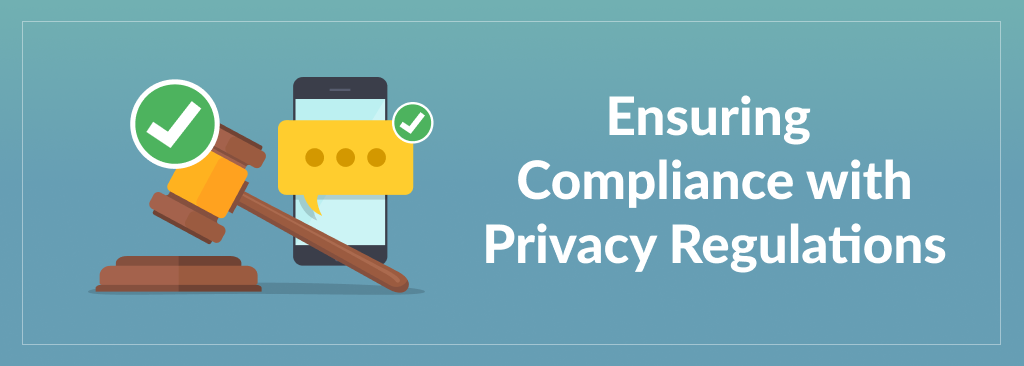Ensuring Compliance with Privacy Regulations
Privacy regulations are not just a legal requirement but also an ethical commitment to safeguarding your customers’ information. However, as regulations grow stricter, maintaining compliance has become increasingly more difficult for organizations.
In this blog, we’ll discuss best practices for compliance and highlight how businesses can adapt their strategies to protect sensitive data and avoid expensive penalties.
Privacy regulations while staying compliant
Privacy regulations exist to protect consumer rights, particularly in how personal data is collected, used and stored. Organizations that fail to comply risk hefty fines and legal repercussions, damage to their reputation and loss of customer trust. However, compliance is even more critical for businesses that handle large volumes of sensitive information, such as financial institutions, healthcare providers and contact centers.
However, just because compliance is important doesn’t mean it’s easy. In fact, compliance issues can be incredibly challenging for contact centers due to the high frequency of interactions and data exchanges involved in their operations. Understanding regulations like the Telphone Consumer Protection Act (TCPA) is the first step towards ensuring compliance with privacy regulations.
Key privacy regulations and their impact
Although this is not an exhaustive list, these two rule sets represent the types of regulations that protect consumers’ privacy that contact centers should be aware of:
- TCPA: The TCPA regulates telemarketing calls, auto-dialed calls, prerecorded messages, text messages and unsolicited faxes. Compliance with the TCPA requires businesses to obtain consent from consumers before contacting them through these channels. Violations can lead to penalties of up to $1,500 per infraction, making it crucial for businesses to document consent and honor do-not-call requests.
- General Data Protection Regulation (GDPR): The GDPR applies to organizations operating within the European Union (EU) or handling the data of EU citizens and mandates strict data protection and privacy standards. It grants consumers more control over their personal data, including the right to access, modify and delete their information. Businesses need to implement robust data management practices, conduct regular audits and establish protocols for reporting data breaches within 72 hours.
Strategies for ensuring compliance with privacy regulations
- Regular training and awareness: Staff training is a fundamental step in ensuring that employees understand the intricacies of privacy regulations and the importance of handling data securely. Regular training sessions and updated compliance guidelines help maintain awareness of changing rules and reinforce best practices.
- Implement robust consent management: Proper consent management is critical for compliance, especially under regulations like the TCPA. Ensure that customers are provided with clear opt-in and opt-out options and that these preferences are honored across all communications channels. Technology can be a helpful tool for tracking, storing and managing these consent records.
- Data encryption and secure storage: Encrypt sensitive data to protect it from unauthorized access. Secure data storage, coupled with strong access control policies, minimizes the risk of breaches and helps maintain compliance with regulations like the GDPR and TCPA.
- Adopt automation tools: Consider using compliance-focused automation tools that can manage callings lists, track consent and ensure adherence to contact frequency limits. These tools can also help generate detailed reports, making it easier to demonstrate compliance in the event of an audit.
- Regular compliance audits: Conduct periodic compliance audits to identify potential vulnerabilities and areas for improvement. Audits should assess the technical security of your systems and the effectiveness of internal policies and procedures. Regular reviews can help businesses stay ahead of regulatory changes and maintain a proactive compliance posture.
- Establishing a data breach response plan: It is important to have a response plan in place in the event of a data breach. Define roles and responsibilities for handling the incident, notify affected parties quickly and document every action taken to address the breach. A well-structured response plan can significantly reduce the impact of a breach and demonstrate a commitment to protecting consumer data.
The role of technology in ensuring compliance with privacy regulations
Leveraging the right technology solutions can streamline compliance management and minimize risk. For example, TCN’s platform is designed for contact centers and includes compliance features like Call Recording Storage, Natural Language Compliance and List Management Services. Such tools can simplify adherence to privacy regulations like the TCPA and the GDPR, allowing businesses to focus on delivering great customer service without worrying about compliance.
By implementing robust consent management, training employees, using automation tools and conducting regular audits, businesses are able to better adhere to changing compliance and privacy regulations. Maintaining compliance not only protects your organization from legal risks but also fosters trust and loyalty among customers, ultimately contributing to long-term business success.
Learn more about how TCN can simplify every aspect of compliance for your contact center.
